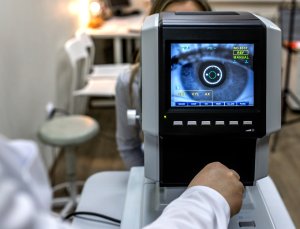Treatment for Diabetic Eye Disease in Pottstown, PA

Voted Best of Berks—
eight years in a row!
Diabetic eye disease, also known as diabetic retinopathy, is a complication of diabetes that affects the eyes. It is caused by damage to the blood vessels of the light-sensitive tissue at the back of the eye (retina). If left untreated, it can lead to vision loss and even blindness. Therefore, managing diabetic eye disease is crucial to preserving vision and maintaining eye health. Treatment for diabetic eye disease in Pottstown, PA, is available at Eye Consultants of Pennsylvania. Let’s explore various treatments:
Control of Blood Sugar Levels
Tight control of blood sugar levels is essential in managing diabetic eye disease. This can slow down the progression of retinopathy and reduce the risk of vision loss. Patients are advised to follow a diabetic diet, engage in regular physical activity, and take prescribed medications or insulin as their healthcare provider directs.
Management of Systemic Health
Managing other systemic health conditions, such as hypertension and hyperlipidemia, is essential in preventing and managing diabetic eye disease. Controlling these risk factors through lifestyle modifications and medication can help reduce the risk of complications and preserve vision.
Regular Eye Exams
Diabetic patients should undergo regular eye exams at least once a year to monitor the progression of diabetic retinopathy. Early detection allows for timely intervention and better outcomes. Dilated eye exams enable eye care professionals to examine the retina and detect any signs of retinopathy, such as swelling, leakage, or abnormal blood vessel growth.
Laser Photocoagulation
Laser photocoagulation, also known as laser surgery, is a common treatment for diabetic retinopathy. It involves using a laser to seal off leaking blood vessels or to shrink abnormal blood vessels in the retina. This procedure helps reduce swelling and prevents further vision loss. It may not fully restore lost vision, but it can prevent the progression of the disease.
Anti-VEGF Therapy
Anti-VEGF (vascular endothelial growth factor) medications are injected into the eye to inhibit abnormal blood vessel growth and reduce retina swelling. Drugs like bevacizumab, ranibizumab, and aflibercept have been approved for the treatment of diabetic retinopathy. Multiple injections may be required over time to maintain efficacy.
Steroid Injections
In some cases, steroid medications may be injected into the eye to reduce inflammation and swelling associated with diabetic retinopathy. These injections can help improve vision and slow down the progression of the disease, but they may also carry risks such as increased intraocular pressure or cataract formation.
In conclusion, diabetic eye disease requires comprehensive management involving lifestyle modifications and various treatment modalities to control blood sugar levels, reduce inflammation, and preserve vision. Regular eye exams are key to early detection and timely intervention. All these measures are crucial in preventing vision loss and maintaining overall eye health in diabetic patients.
Individuals with diabetes need to work closely with their healthcare providers to develop a personalized treatment plan tailored to their specific needs and risk factors. Treatment for diabetic eye disease in Pottstown, PA, is available at Eye Consultants of Pennsylvania. We are widely regarded as the best eye team in Pennsylvania, so give us a call today to schedule your appointment.
Find a Doctor
Physician information including education, training, practice location and more.
Schedule an Appointment
Call 800-762-7132 or make an appointment online.





